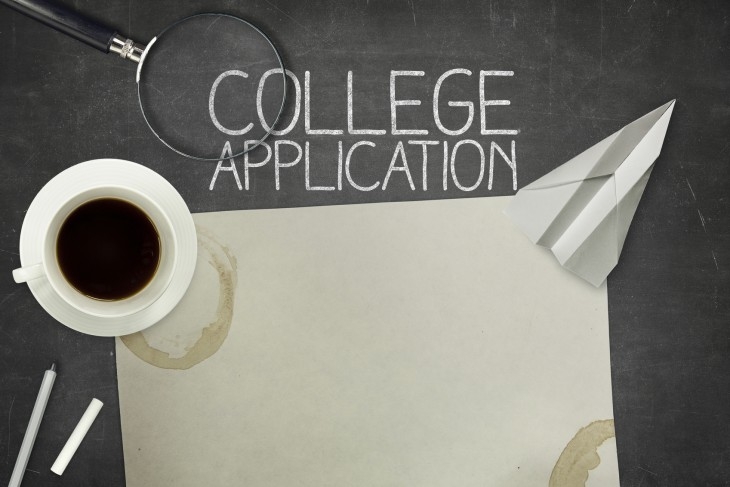How do I get on an FE College course?

Ultimately every student must make the decision about the college and course that is right for them!
Do some research into the colleges close to you; can you get there, how long is the journey? Do these colleges seem like somewhere you could happily study for one, two or three years; is there support for students, financial help, active clubs and societies?
And what about the courses? Ask yourself where you want them to lead, what do you enjoy, what are your strengths and interests?
You can find out what courses are on offer at FE Colleges by looking at their websites, or read on for an eight point plan for getting onto a college course.
Eight point plan for getting on a college course
1. Find a college
Look at a map of all the colleges in the local area and see which you could travel to. Explore their websites to see what they offer.
2. Find a course
Find a course to suit your interests, strengths and future career plans. Check the entry criteria to see if you think you will meet the grades required and then have a back-up, just in case your exams don’t go to plan. Contact your chosen college if you are not sure.
3. Investigate the travel options
How will you get there? How long will it take to get there? How much will it cost? Can you share a lift? How long is the journey?
If you are on a low income or live more than three miles from the college you may want to contact the college to find out if there is any help towards the cost of travel. Lots of colleges offer travel passes through deals with local bus or train companies. Some colleges may have funds or bursaries to support students with these expenses.
4. Attend a college Open Evening/Day
An open evening/day will give you a chance to look around the college and talk to staff and current students. There may also be presentations about different courses or aspects of college life, such as enrichment activities, sports clubs, or Student Union, for example.
Useful questions you could ask at an open event:

- What are the entry requirements?
- Will I have to take Maths and/or English in addition to my main course?
- How is the course taught and assessed?
- What do you learn about on the course?
- Will this course help me to get into a specific career?
- What do current students say about the course?
- Where do people go on to after they finish the course?
- What opportunities are there for employability or volunteering activities?
- What help is available for me if I have specific learning needs or a disability.
- What are the facilities like?
- What can you get involved in outside of lessons?
5. Find out extra costs
Further Education for under 19s is free but some study programmes may have additional costs associated with them. Find out if there are any extra costs like exam fees, trips, materials, tools, a uniform.
All colleges are able to advise on financial support for students (learner support funds, bursaries, grants). Often these funds are based on your household earnings. Find out if you are eligible for any financial support with these costs by enquiring at the college.
6. Complete an application form
If you have applied for several different types of courses the college may contact you to offer you some careers advice.
Each college has their own application form which may be available online to download or to request as a paper form. There may be different application forms for part time or full time courses or different types of course, such as Access to HE. Once you have submitted an application to the college, they will invite you for an interview.
Applying for a Higher Education level course in a FE College:
If you are applying for a Foundation Degree or a HNC/HND course you may need to use the UCAS application form or the college application form. Check with the college.
7. Prepare for an interview
- Make sure you give a great first impression; be on time or early, turn off your mobile phone and be prepared
- You may be invited to an audition, an aptitude test or interview depending on the course you are applying for – these details will be sent to you when you are given an interview invitation
- If you are set a piece of work to bring along make sure you put some effort into this, as this may be as important as the interview and can be used to judge your level of English, as well as your presentation skills
- Most creative courses such as Art or Photography like to see a portfolio of work at interview. This does not have to be school-work, it could be something you do in your own time!
- Make sure you are enthusiastic about the course and be prepared to talk about yourself. Below are some typical interview questions you may be asked
- Let the college know if you have additional needs or a disability and if they need to support you at the interview or you would like to bring someone along
- In most cases, you will be made a ‘provisional’ offer. This means that if you meet the entry requirements you will be able to join the course. If you are waiting on exam results, and you do not do as well as you had hoped, contact the college as they may be able to offer you an alternative course
Typical Interview Questions

- What do you know about the subject you are applying to study?
- Why are you interested in this subject?
- Why do you want to attend this college in particular?
- What are your short-term and long-term goals?
- What do you like to do in your spare time?
- Have you ever done any volunteering?
- What makes you more suitable for the course than another applicant with the same grades?
- What do you think will be your biggest challenge?
8. You have been offered a place!
You will hear in writing if you have been offered a place or not. You may be offered a place on an alternative course if you are not successful in your first choice.
Make sure you let the college know if you want to accept your place so the college continues to hold the place open for you.
Taster Days
You might be invited for a taster day or induction event to see if you like the course, before you get your results.
Results
- When you have received your exam results confirm your offer or your back up offer, if you have one.
- You will need to bring evidence of your exam grades to college when you enrol on your course.
- The colleges offer lots of support and advice so if you change your mind or don’t get the results you were hoping for you can contact the college to speak to a careers adviser.
- If you have not achieved a level 4+ in English and/or maths in your GCSEs, you will have to study these at college either as a re-sit or a Functional Skills course as part of your study programme.
Before Starting your Course
Most colleges will write to you with information you need to start your study programme:
- The date of your enrolment day and what you need to bring
- Any fees you need to pay
- College term dates
- How to get help with financial costs
- How to order any uniform, materials and books you will need
- Make sure you have investigated how you are going to get to college, especially if you are using public transport
- Check dates - It is really important that you do not miss enrolment or the start of your course and this can be as close to GCSE results day